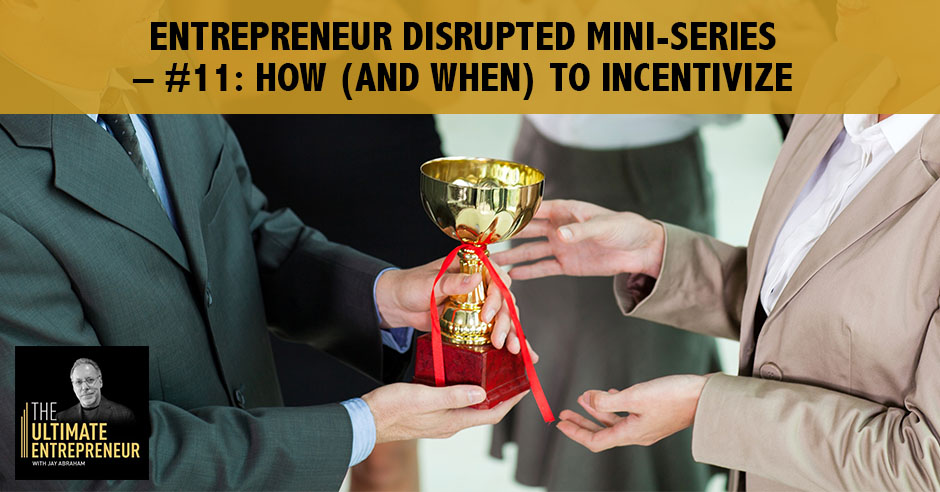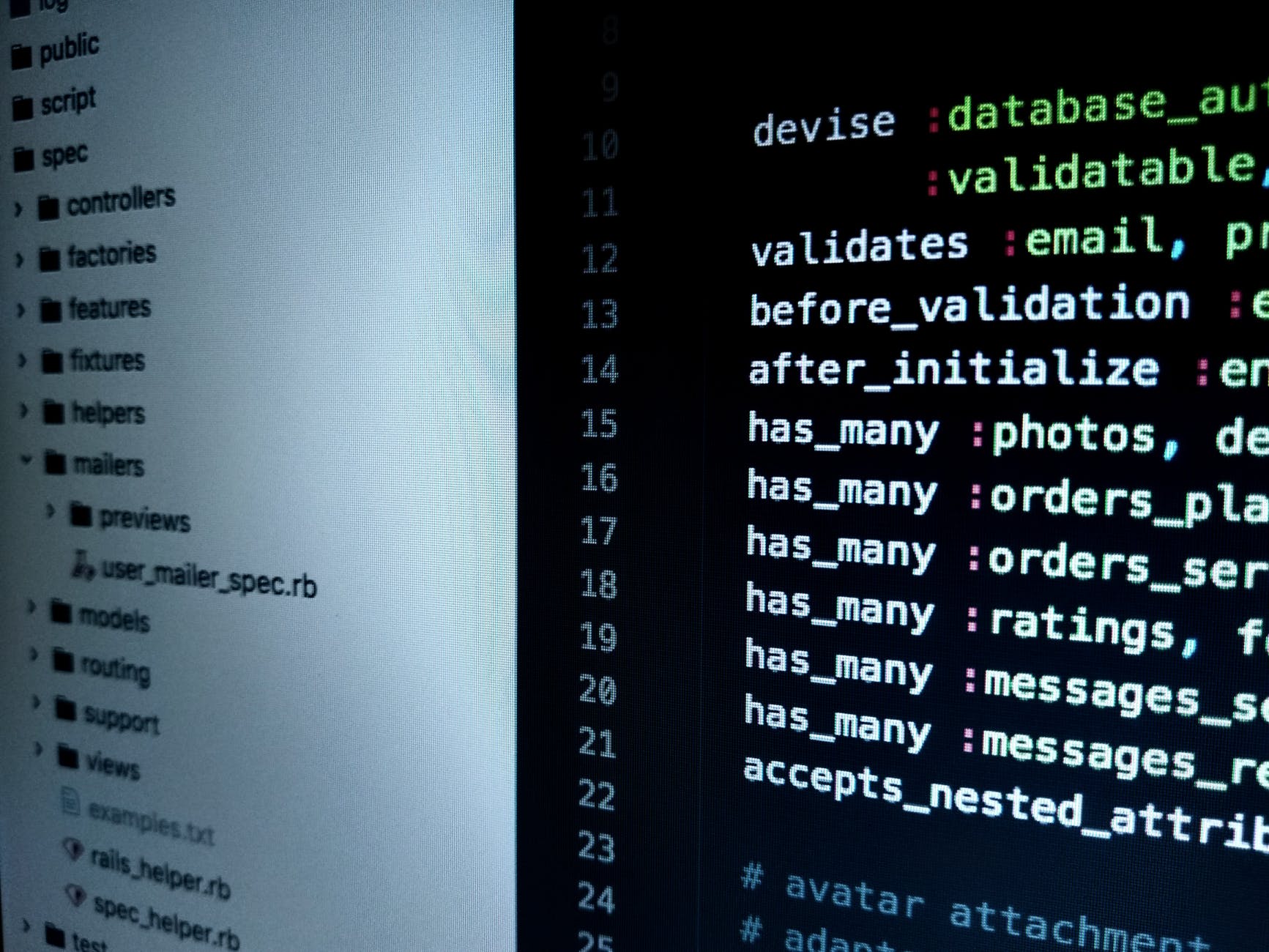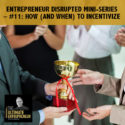
If you can’t enjoy the process of what you’re doing, is it even worth doing it in the first place? Nowadays it is important to create and instill both an element of fun and inspiration with those you work with – a philosophy that does not apply just for business, but also for all aspects of life and everyone you interact with. Dave Asprey and Jay Abraham discuss in #11 of Entrepreneur Disrupted the essential and non-essential parts of incentives; the art of gifting – the right kind of gifting showing true genuine appreciation to those you work with; creating an environment both where people want to be and where they feel special; and how flexibility is one of the greatest incentives you can offer. Always remember – if you can’t enjoy the process, you’re not engaging your full emotions.
Listen to the podcast here:
Entrepreneur Disrupted Mini-Series – #11: How (And When) To Incentivize
This episode is all about incentivization. If you can’t enjoy the process of what you’re doing, is it worth doing it in the first place? Dave and I are here to guide you in creating, instilling, and installing that level of productive fun within those you work with. This is a philosophy not just for business, but also for all aspects of your life itself and it goes towards everyone you interact with all day, all night. What we cover ranges from which parts of incentivization are important and which ones aren’t. We cover the art of gifting, the right kind of gifting that shows true and genuine appreciation for those you work with and want to work with. We discuss creating an environment both where people want to be and where they feel special, along with how flexibility is one of the greatest incentives you could offer the right person.
I hope you enjoy what Dave and I have put together for you but most of all, I hope you do what is essential to your own aspirations and take action and follow through and apply and implement the wisdom and advice we’ve distilled, shared and exampled here.
I’m your host, Dave Asprey, here with Jay Abraham. We’re a couple of entrepreneurs, one of us a little more experienced than the other, you can guess which is which, who have had a few good achievements. We’re here to share things that are going to help you solve problems that you may have, either working for an entrepreneur or being an entrepreneur. This is all about business and helping you disrupt yourself, disrupt your industry, disrupt your bad habits and all the other things that need breaking so that we can do them better.
The problem we can help you solve in this episode is knowing how to incentivize people you work with, what perks are important and which ones aren’t important. This is a complex topic and I’m excited to get Jay’s take on it because Jay has one of the most creative minds I’ve seen around making up the craziest incentive structures and sharing rights to this. He thinks very outside the box even by my standards on that, so we’re going to learn some interesting stuff there. I’ll talk about some very non-traditional perks and things that I’ve built into Bulletproof and things I’ve seen absolutely not work at big companies. Jay, do you want to start by what you do with your team now? What perks matter? What do you do to incent them?

I do two things. First of all, we have more fun doing good than anybody I know. My attitude is if you can’t enjoy the process, you’re not engaging your full emotionality. I’m fun. I’m not undemanding, but I’m fun. I don’t have a big team anymore. I want people to know that I’m interested in their lives, even if it’s only for two, three, four, five minutes because it’s psychic incentive. I’ve got bad memory, but I try to remember, and I want to know about their kids or their girlfriend or their vacation. I do want to know because I want to be connected to them, that’s one thing. I try to figure out what is the most unexpected acknowledgement they can get. I have an advantage most people don’t. I do a lot of barter deals, so for example, you’re wearing a hat. I have a client. A lot of them don’t have deep pockets, but I have adult kids. I get $20,000, $30,000, $40,000 worth of thousand-dollar hats that no one in their right mind would get a couple of hours of my time.
I’ve met them and they are cool guys. Melin, I am wearing a Melin hat. They’re like $300 and up hats that are made out of exotic materials. They are worn by rappers and celebrities and then me.
I get a lot of perks. I’ve been so blessed in my life, so I’ll give things that are so unique and priceless in two terms. They’re usually expensive, but they’re usually unusual to people because I’ll make them a hero in their own group. I will take them places but unusual, like I send people to other people’s events that stretches and that they would never even think to go to themselves. They work very hard. I’m a multi non-multitasker because it doesn’t exist, which means consecutively.
You don’t multitask? You just do everything at the same time?
Yes, that’s right. Multitasking doesn’t exist, so it’s sequential tasking or it’s a micro tasking. We work very hard. A lot of what I do is not as access critical everyday to be in the office and on the phone, so I’ll let them go. Not let them go like terminate them, I’d say “It’s a beautiful day, go to the beach,” then we’ll just close the office. We have a young man who’s very gifted. He’s got a very limited budget and he loves clothes, but he can’t afford it, so we bought them a whole wardrobe. I told you this, I’ve had people who couldn’t afford to get their teeth fixed and I would say, “You’ve got to do something for me. It’s for three hours and here’s the address.” I do a lot of unexpected things. This is not meant to be covert, but I do a lot of things to instill a very high sense of ethos, contribution, and long-term thinking.
We have one salesperson, for example, a very nice man and I’ll have him do a lot of things for me and if something doesn’t work well, he’ll get all the money, and I’ll just fulfill on the activity. We had a client that stopped paying us, and the young man who was managing them had worked his heart out. I negotiated with the client, so they would pay the young man for his time. I do a lot of things, but I explain it when I’m talking to the staff in a way that I want them to understand my reason why because I’m trying to set not just a belief system and a value system, but a long-term human interaction system. I do a lot of what you and I tried with your group where I try to get everyone to appreciate what everyone else is doing, but I’m a terrible manager. That’s why my daughter runs it.
Probably the best thing I do is a by-product of what I do. I don’t handle the top elevated corporations, but the scope of people that are normally drawn to me and that come into my office. We have a very eclectic office. It was designed by the guy that owns the Four Seasons on Doheney. It’s got huge rich oak panels. It’s got English fixtures. It’s got brick and it’s smacked dab center on the airport, right in the middle of the runway in Torrance, and it’s a helicopter center. It’s a private jet center. When people come in, it’s interesting, but I let them get to talk to the people and the people that I attract are very high quality, high ethos. They have high values, they are contributors and it’s osmosis.
The perk there is creating an environment where people want to be.
I also let them be. An environment where they feel part of something special, but I also have two different kinds of compensation. Individuals get compensated for certain things and then they share on combined achievement. We don’t give huge bonuses, but we give bonuses unexpectedly, acknowledging above and beyond the cause.
Those can all be a good way of incenting. A lot of those are hard to measure than if you give occasional bonuses or something. I watched the evolution in Silicon Valley. Everyone knows Google; they have chefs and all this stuff. What they don’t know is that Google’s headquarters used to be called Silicon Graphics. This was one of the two largest mini-computers. They were workstations that you could use. Silicon Graphics made tons of money mostly because Hollywood was using their stuff to render some of the early digital movies like the first Terminator. SGI was the first company to have full-on espresso machines in the office that any employee could go use. They started the trend and their headquarters is Google’s building number one, the big famous one with all that stuff.
I used to go there back when they were SGI because I was dating an SGI employee. Every lunch, I was like, “Can we go to your office?” I was going to fill a full shot of espresso and fresh milk delivers there every day. That was where all that stuff started, but it does get to be manipulative at a certain point. Breakfast, lunch, and dinner will be provided here, and if you’re not here for one of those, you probably missed the meeting that happened over breakfast anyway. What that does is that takes away from time with your kids, time with your family. It can work well if you don’t have a family or you don’t have kids or if your family also works at the same company, which is one way to solve that.

That’s happening increasingly at big companies. However, I think that putting more hours in doesn’t necessarily mean more productivity. Putting in the right hours with the right energy is how I perform better. What that means is that if you work ten hours and you’re exhausted, you might do less work or less important or lower quality work than if you worked seven hours and got stuff done and took an hour to go for a walk. That sounds weird and it may be different depending on if you’re a cashier, you have to stand at the cash register or you can’t be a cashier. There’s no getting around that. If you’re writing, you’re creating or doing a marketing campaign, even if you’re writing code, a lot of times this focus on work more instead of just getting stuff done isn’t there.
For me, having an environment where people want to be is important. It’s so important that most Bulletproof employees are in their own environments. We have a highly distributed culture. Our headquarters is in Bellevue. Our headquarters isn’t as nice as I’d like it to be. It’s in an office building where we don’t have full control of it yet and we’ll probably make some changes there because it’s getting full. Even then, we’ve got high quality coffee. As you’d expect, it’s Bulletproof coffee and we’ve got a good culture but also one where people are free to come and go. Some of my top execs, they show up but they’re not in the office all the time even though they could be. When you want to talk about a perk, don’t commute. That will absolutely change your quality of life.
I used to commute an hour and a half a day for a long time. I had a fourteen-mile commute, not very long, and it took an hour and a half to two hours to drive fourteen miles. I could ride a bike faster than that. This was just a across Silicon Valley during the boom times like it is now. It’s insane. It could be another two hours home. If you’re spending even an hour each way, your quality of life is going to suck. You’re not going to exercise, you’re going to be tired. You put in eight hours at the office and you go home and you’re like, “It was dark when I left. It is dark when I got home. I didn’t get to see my gardening. I didn’t get to do anything,” even if you have a nice place to live.
Flexibility is one of the big perks that I offer and you still have to get your stuff done. A lot of people do work from home. A lot of the marketing people show up when they need to but they’re oftentimes living in a different state. This presents all sorts of cultural issues. I figured I was running a company that would never be venture backed because of that. I live on an island. I don’t live where my headquarters is. I go to the office every now and then, but I show up via Zoom or Skype or one of those beam robots. Thanks to Peter Diamandis, who first showed me those a couple of years ago. I can roll in to the conference room or roll in to the coffee shop and my face is on a little robot. It’s surprisingly engaging and it’s better than teleconferencing. You can do stuff like that.
The big perk there is I’m able to attract and hire and retain people who are on mission and who don’t live there. On the downside, when you hit a certain point where Bulletproof is, it costs a lot of money to go to a new state and register with the state to be an employer and you have all sorts of paperwork, which is drudgery and it doesn’t add any value to your company at all. It can cost $20,000 for this state, $40,000 for this state, and at that point we started limiting the number of states that we’ll hire from, but early on I didn’t even do that. It was wherever the right people are, but I wasn’t paying them that much because it was a small company and we’re bootstrapped.
Telecommuting is one of the biggest things you can do. I just focus on the mission and focus on getting things done. Occasionally, I’ve had people abuse that. I had one person take another job while doing this. It always gets out when that happens and that’s why you have the other “F” word, which is not fear or failure, it’s fire. That’s one of those times where it’s so critically important that you fire the person because everyone else in the company needs to know like, “We draw a line here. This isn’t acceptable. We’ve got to do this.” That’s one perk that can backfire, but it’s valuable. The other downside is on the cultural side. It means you spend some money to bring people together and it means that you have all hands meetings that are virtual. This is increasingly common, and it means you invest more in tech to allow people to be productive and to still function as teams.
I don’t know the answer to that and some people can post comments. Go to the Dave Asprey Facebook page, and tell me what you use there. We’ve experimented with Slack. We’ve experimented with Asana email and other things like that. Most companies now have a mishmash of these things. They play around with them. I would like to tell you I have that hacked all the way, but I don’t. I’ll tell you when I get it. We’re working hard on that to be more effective, so we can keep scaling without having to have everyone come into the office.
The other perks though, from very early on, my employees all get $175 a month of a coupon for the Bulletproof store. They can spend it on whatever they want, and they also get a massive employee discount at the store. You have all the coffee, all the Brain Octane. You also get Bulletproof Bars and Unfair Advantage, and all this stuff that’s core to my own performance. Everyone in the company has that. That’s more important than a health plan from the way I see it. We also have a health plan. It’s mid-tier because, at least the people that work for us, they all know very well that if you get hit by a bus or you have a bad infection, you’d probably want to go use the health plan, but the rest of the time, they’re not that useful because that’s not how high-performance people work. I invest in preventative maintenance for people.
We also have a bunch of technology that I send to employees. For Christmas last year, our employees got EMF-blocking mat. Our employees got a Defender Shield custom-made Bulletproof mat. This is a map that blocks EMF, so if you’re going to sit with your laptop on top of your crown jewels, you might as well not cook the eggs, so to speak, and there are health benefits to doing that. Many of the employees have the Bulletproof Vibe, which is a $1,500 platform that the Employee of the Month wins. Many times, others have received various devices. These are perks people want. We all want to feel good. We all want to feel that energy. You’ll probably get better work done and you’ll have a better quality of life the rest of the time. I look at perks as a way to give back to people, things that are interesting to them where they might not have made the investment in themselves.
Other things, flexible work hours are particularly important. This is something that I fought with in Silicon Valley for years. I’m not a morning person. I’m a hacker. I force myself to be a morning person. I woke up at 5:00 every morning for two years. I taught myself to do it. I’d wake up and I’d spend an hour meditating because that is a time when there’s no one bothering you. My circadian window is long. I’m not a morning person naturally. Don’t feel that it’s good or bad to be a morning person. Sales people do this because they’re insane. They always want to have the 8:00 Monday morning meeting, which means for me waking up at 6:00 AM in the middle of the night. I was a sales engineer and a good one. This was before I was an evangelist. At this point, I’d already made $6 million and I was very well-respected sales engineer. New sales guys could get checks but no one knew how to match the check to the products without what I did, so it was a meaningful position. I’m like, “These sales meetings are dumb.” If you’ve ever sat in a sales meeting, and a lot of people probably haven’t, but I’d love sales culture, but it’s not my culture. You sit there, and everyone does this dance and they say, “What’s your number? What’s your percentage likelihood that you’re going to hit your number?” It’s very ritualistic and it’s always like a sweat fear where the sales manager twists everyone’s arm a little bit like Glengarry Glen Ross. I’m like, “I’m a damned engineer. I don’t have business in that meeting but I’m part of the team.” I started showing up 45 minutes late because it worked better.
I don’t like being tired and sitting in a room full of people doing stuff frankly that I didn’t care about. I already knew what the accounts were because I had to go talk to the technologists. I started showing up late. There was consternation from sales manager, “It’s about respect,” and whatever else. That’s the opposite of a kickass environment. If you need to start your day at 9:00 or you need to start your day at 6:00 AM, I don’t care. If you need to take an hour off in the middle of the day to go work, are you getting stuff done? Are you achieving things? If you are getting things done, that flexibility is built in. I’ve always wanted to work in a company like that and I never did, so I decided to build a company like that. Those are the perks that I use. As an entrepreneur, you can use any of those perks.
I had an experience when I was less than self-controlled individual. I would put a lot of people into training situations, give them very generous variable. They would do well because I chose correctly as far as talented ability and then they’d want more and more. I used to have a dumb way of getting angry and throwing them out. Instead, I started saying, “How about this? You want to make more? I’ll fund you and own half of it. We’ll move you into your own office and you can don’t compete directly or if you’re going to compete directly, compete in a different niche.”
I have a big client in Taiwan. He’s a psychiatrist that gets 5,000 new patients a month. He deals with unsolvable problems the hospitals and the doctors can’t figure out. He’s got 85 or 90, does the parasympathetic and sympathetic and he’s got custom everything, but his biggest problem is they all want to see him, so he tries to build colleagues. The colleagues go next door and compete. We created a whole new hiring protocol where the deal is if they want within sixteen or eighteen, he’ll just put them into another clinic and fund it and give them half ownership as long as it’s geographically not going to divert or supplant his own, and they’re going to create wealth. If they don’t want it, then it’s fine, but they have to agree to that or we’re not going to hire them.

A lot of people are very chintzy with the wrong part of compensation to the people that generate money. If it’s a sales force, they usually have flat rate or they have flat rate with bonus. Sometimes it can be retroactive but it’s usually predicated on aggregate sales. What I try to do with my clients is identify what the value of a type or source or kind of buyer is over forever because they’re worth more or less.
Many years ago, I had a client and they did a fluid transmission product. It sounds very esoteric, but it’s PVC pipe that’s used in agriculture, bottling chemicals. It takes syrup, it takes water, it takes chemicals to different parts of manufacturing plants, bottling plants, etc. This guy, a salesman in California, had a very stock deal. They got 10% of the profit on everything they sold. I asked very quantifiable questions and correlatable questions and I said, “What is a brand-new account worth?” I always ask the worst case. “Open a new account, what’s it worth in year one?” They never looked. I gave them an assignment to come back. I want to know, “What was your year one? How many years on average they buy? How many times a year on average, worst case, they’d buy?” They never looked, and I took the worst case in each scenario. It turns out, the average first time new client is worth $200 in profit.
The average new client buyer buys five times a year $200. The average one stays three years. $200 times five times three years is what? $3,000. Their compensation was 10% of the profit. I said, “I’m going make a cosmic psychic prediction that you guys haven’t opened many new accounts for a long time.” He said, “They hadn’t.” I said, “Because the incentive is 10% of $200, so they’re going to make $20.” I said, “Why don’t you try this? Tell them that as long as these salespeople keep their current, be their territory market, product line production, at par, meaning whatever it’s been averaging, whether it’s cyclical, whether it’s seasonal, whether it’s just flat, that anytime they open a new account above that level, they can have 100% of the first purchase profit.” These guys were crazy. They said, “Why would we want to give away $180 of the first sale?” I said, “No, you’re not. You’re investing $180 one time for 90% of the $2,800 you’re absolutely going to get over the next three years. Try it. It’s not smoke and mirrors.” They did that, and their sales exploded five times.
Let’s do a whole episode about compensation models aside from the perks that are non-monetary stuff because this is a hard thing for entrepreneurs to talk about. So far in this episode, we spawned more conversations than a lot of value for people. We’ve talked about some perks but I didn’t talk about probably the super mega extreme perk that I’m offering. It’s a question of, “How involved should you be in your employees’ lives?” The big question there is, “Is it ethical to hack your employees’ brains?” That’s the perk I’m talking about. The other one that we should mention is vacation time. I went over about eighteen months ago to unlimited vacation time for my people. What I realized there is that people were hoarding vacation time. I want people to get stuff done. You can go on vacation and I make a point to go on vacation. I was in Hawaii for a week and I did one phone call and that was it. I didn’t have to but I wanted to. People get a little nervous always when they want to take a vacation, but now it’s a conversation of, “I’m going to go to this and here’s what I’m going to cover while I’m gone.” It encourages people to cross train. As an entrepreneur, accounting for vacation and accruing and moving beans around that are all fictitious, it’s not meaningful, it’s not helpful. If someone is performing well and they want to take a month off, they arrange that every time and their manager works with them, great. If their manager says, “No,” “Do we have a performance issue? Is it an unreasonable request?” If you’re hourly, there’re laws about that, but for exempt employees, having the ability to plan and choose your vacation in a meaningful way is important for me.
I close down and don’t consider it vacation and let everyone off for Christmas, holiday time. Every time, it’s always pretty big. When I travel, if there’s not much going on, I let them take off, but this is a very meaty subject to build on.
On our next episode, we’re going to talk about, “Should you hack your employees’ brains?” and a broader question of, “How involved in the biology and the psychology of your employees do you want to be?” That will be a little controversial.
Important Links:









